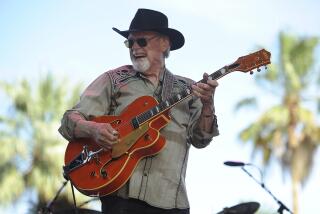Joey Ramone; Lead Singer of Pioneer Punk Rock Band
- Share via
Singer Joey Ramone, the reed-thin punk rock icon who as a member of the Ramones influenced rockers from the Sex Pistols to the Offspring, died Sunday. He was 49.
Ramone, the lead singer with the Afghan hair, pallid skin, leather jacket, tinted glasses and crooked smile, died of lymphoma.
The four-member Ramones came out of Queens with limited musical skills, but by 1976, their staccato riffs and full-frontal garage rock assaults began to make their mark on British punk musicians. The band has been acknowledged by many as the inventors of punk rock.
“They’re the daddy punk group of all time,” said Joe Strummer, lead singer of the Clash, in a recent Spin magazine interview.
It was praise that clearly warmed Joey Ramone’s heart.
“There’s nobody as good as the Ramones, never will be,” he told The Times in 1995, months before the band broke up. “I mean everybody’s just emulated us and now everybody just kinda takes our sound as their foundations.”
Among the Ramones best- known songs were “I Wanna Be Sedated,” “Teenage Lobotomy,” “Sheena Is a Punk Rocker,” “Blitzkrieg Bop,” and “Beat on The Brat.”
Known less for trenchant observations than for winsome invitations to “Hey, ho, let’s go!” the Ramones demonstrated a quirky humor in catchy, straightforward songs. “Urban surf music” is how Rolling Stone magazine described the Ramones’ style in 1992.
In 1979, Joey and the band appeared in the Roger Corman movie “Rock N’ Roll High School,” contributing the title song to the soundtrack.
Joey Ramone was born Jeffrey Hyman on May 19, 1951, in the New York City community of Forest Hills. He began playing the drums at age 13.
During the early 1970s, he played in several New York bands--occasionally under the name Jeff Starship. But it was only after he teamed up with Dee Dee, Johnny and Tommy Ramone--none of whom were really named Ramone--that Joey began to make inroads as a musician. The band took the name after Dee Dee heard that Paul McCartney used to check into hotels under the assumed name Ramone.
The band got its start playing at CBGB, a club that spawned such contemporaries on the New York scene as the Talking Heads and Blondie.
The Ramones never cracked the Top 40. In fact, they never even cracked the top 60.
The band released more than a dozen albums, of which only two--1977’s “Rocket to Russia” and 1980’s “End of the Century”--even broke the Top 100 on the national album chart. They reached No. 49 and No. 44, respectively.
Only three singles ever made the Top 100 nationally, the highest chart position achieved by “Rockaway Beach” in 1977. It reached No. 66.
Nevertheless, their influence on rock music--and especially punk--was never fueled by outright hits. Their attitude could be just as pervasive as their songs.
“Though the Ramones’ music wasn’t strong enough in itself to lead a revolution, they did offer a blueprint for the future--and a brigade of bands in England carried the sound to new heights,” said Robert Hilburn, The Times’ pop music critic. “But the legacy of the Ramones doesn’t end with punk acts. Many of the most prized mainstream rock groups of the last two decades, from U2 and R.E.M. to Nirvana and Pearl Jam, have also been inspired by the purposefulness and grass-roots spirit of the Ramones and the punk movement. For that reason, Joey Ramone stands as a major figure in the history of rock.”
Spin magazine named them one of the seven greatest rock bands of all time. Pete Townshend joined them on a version of the Who’s “Substitute.” Two members of Green Day named their children Joey and Ramona. Kurt Cobain, the late singer of Nirvana, once told an interviewer that his loftiest ambition was to play in a band like the Ramones.
In an interview with The Times, Joey Ramone said the band was motivated in part by a dearth of cutting-edge bands during the early 1970s.
“We started in ’74 and the only thing that you heard on the radio was disco, whereas you used to hear great, great music like the Kinks and the Who and the Beatles and all that stuff,” he said.
More to Read
The biggest entertainment stories
Get our big stories about Hollywood, film, television, music, arts, culture and more right in your inbox as soon as they publish.
You may occasionally receive promotional content from the Los Angeles Times.










